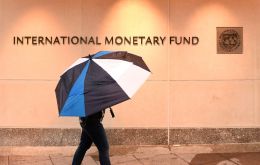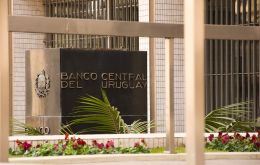MercoPress. South Atlantic News Agency
Tag: debt
-
Tuesday, August 29th 2023 - 09:17 UTC
Paraguayan banana exporters concerned over Argentina not paying for shipments

Paraguayan banana exporters met Monday in Asunción with Foreign Minister Rubén Ramírez Lezcano to seek help from the government in order to collect the debt from Argentine buyers who are behind in their payments of some US$ 6 million, it was reported. The producers fear the problem might get worse if no action is taken.
-
Wednesday, July 12th 2023 - 10:22 UTC
Number of Brazilians in debt on the rise

According to the monthly Consumer Indebtedness Survey (Peic) from the Brazilian National Confederation of Commerce of Goods, Services, and Tourism (CNC) released Tuesday, 78.5% of the families in South America's largest economy are indebted and behind in their payments, Agencia Brasil reported.
-
Saturday, December 18th 2021 - 09:02 UTC
Global Debt Reaches a Record US$226 Trillion

By Vitor Gaspar, Apulo Medas, and Roberto Perrelli (*) – In 2020, we observed the largest one-year debt surge since World War II, with global debt rising to US$ 226 trillion as the world was hit by a global health crisis and a deep recession. Debt was already elevated going into the crisis, but now governments must navigate a world of record-high public and private debt levels, new virus mutations, and rising inflation.
-
Friday, November 5th 2021 - 09:15 UTC
More Brazilians in debt amid growing inflation

Brazil's economic crisis has led to an unprecedented number of households being unable to repey their debts, it was reported Thursday.
-
Saturday, August 21st 2021 - 09:20 UTC
Investors wary of South American debt in local currencies

South American debt in local currency has become a painful experience for international investors, with little signals of relief and reversal of the situation.
-
Friday, October 2nd 2020 - 09:09 UTC
Consumers' debts threaten the Peruvian banking system

Peru's economy could plummet by more than 20% if unpaid consumer debts continue to mount, a scenario the government hopes to stave off with an emergency plan to reschedule troubled loans with state guarantees, the government said on Thursday.
-
Saturday, August 1st 2020 - 06:11 UTC
Ecuador extends deadline for negotiations with bondholders

Ecuador will extend the deadline for creditors to vote on its US$ 17.4 billion debt restructuring plan to Monday following a lawsuit by a small group of bondholders, the finance ministry said on Thursday.
-
Tuesday, July 21st 2020 - 08:45 UTC
Ecuador closer to reach a US$ 17,4bn debt overhaul agreement with bondholders

Ecuador pushed forward with its debt overhaul plans on Monday, requesting a vote among its creditors on reconfiguring the terms of US$ 17.4 billion of its external bonds, with its largest group of creditors backing the proposal.
-
Thursday, June 25th 2020 - 12:03 UTC
Uruguay raises US$ 2 billion in dual currency fresh funds

Uruguay raised US$ 2 billion from a dual-currency debt deal on Wednesday, issuing UYU47.1 billion (US$ 1.12 billion) in new inflation-linked, 20-year notes and adding US$ 400 million to its 4.375% 2031 bonds, plus a rescheduling of US$ 500 million in 2027, 2028 and 2030 Indexed Units.
-
Wednesday, June 17th 2020 - 08:22 UTC
Argentina extends confidentiality agreements with creditors for one day

Argentina has extended confidentiality agreements with creditors by one day to allow further negotiations as the two sides seek a last-ditch agreement to restructure around US$ 65 billion in debt.
